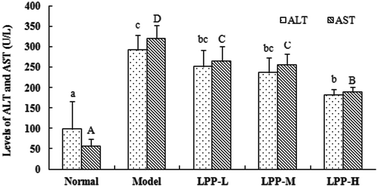Phenolic-rich lychee (Litchi chinensis Sonn.) pulp extracts offer hepatoprotection against restraint stress-induced liver injury in mice by modulating mitochondrial dysfunction
Abstract
The pulp from lychee, a tropical to subtropical fruit, contains large quantities of phenolic compounds and exhibits antioxidant activities both in vitro and in vivo. In the present study, we investigated the mechanisms underlying the hepatoprotective effects of lychee pulp phenolics (LPPs) against restraint stress-induced liver injury in mice. After 18 h of restraint stress, increased levels of serum alanine aminotransferase (ALT) and aspartate aminotransferase (AST) activities were observed. High levels of thiobarbituric acid reactive substances (TBARS) were also found. Restraint stress causes liver damage, which was protected against by LPP pretreatment at a dosage of 200 mg (kg d)−1 for 21 consecutive days. This treatment remarkably decreased the serum ALT, AST and TBARS levels, elevated the liver glutathione (GSH) content, and the activities of glutathione peroxidase (GPx), superoxide dismutase (SOD) and catalase (CAT). Furthermore, respiratory chain complex and Na+–K+–ATPase activities were enhanced in liver mitochondria, while mitochondrial membrane potential levels and reactive oxygen species (ROS) production decreased. Thus, treatment with LPPs ameliorated restraint stress-induced liver mitochondrial dysfunction. These results suggest that LPPs protect the liver against restraint stress-induced damage by scavenging free radicals and modulating mitochondrial dysfunction. Thus, lychee pulp may be a functional biofactor to mitigate oxidative stress.


 Please wait while we load your content...
Please wait while we load your content...